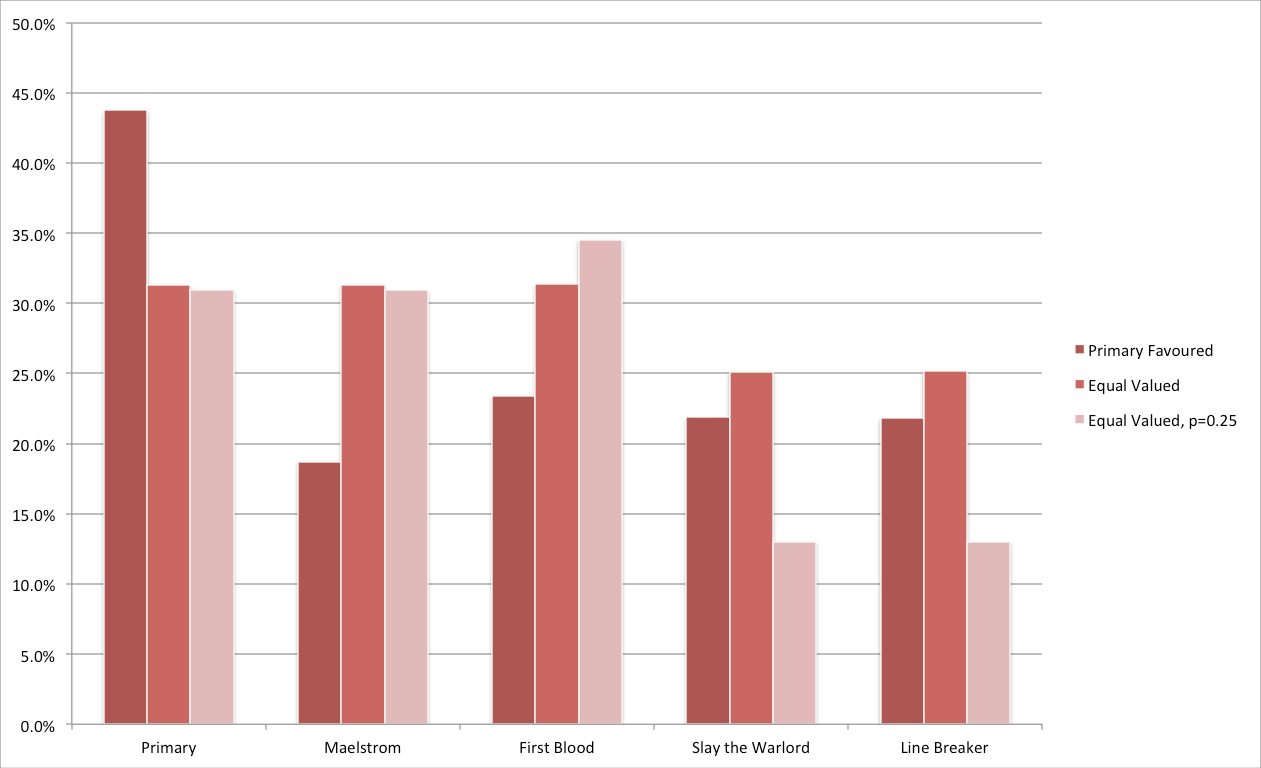TinBane the Aussie, discusses game points in the ITC format.
Frankie and Reece had an interesting discussion on the podcast recently. If the maelstrom and primary objectives are worth the same game points (rather than 3 and 4 respectively) does this make first blood less or more important? One perspective, is that first blood is less of the proportion of total points in the game, and therefore contributes less to the outcome. Another is the vague hand-wavy explanation that it’s odds of being the tie-breaker between two sides is raised.
Who is correct? My gut is that it’s the latter, evening out the two major contributors means that it will contribute more to the likelihood of victory. And that’s based on a very real, and very serious real world model: two party systems, worldwide. When you have a balanced, or close to balanced, traditionally “two party” system, the major parties have to negotiate with the independents to pass or deny legislation. If you have 251 or 25,000,001 members in the party, that one independent has the only vote that really matters. That’s right, politics and gaming in the same thread, in effect and analysis of the role of point “blocks” to outcomes in either case.
Okay, so the simplest way to find out the answer, is to model it. I’ll lay out here, my assumptions:
There are three objectives (primary, secondary, first blood) that can only be scored once each, and are always scored. Therefore we’ll assign the odds as 50/50 for each, and make them independent of each other (winning primary in our model, doesn’t effect the odds of winning secondary).
We have a set of other objectives (line breaker, warlord) which can be won by nobody, everybody, or one player. Now with these objectives, the best idea is to work out what’s the worst scenario for the opinion I’m trying to push, and use that scenario. It adds conservatism to the results. The worst case, is each player having a 50/50 chance of winning any of these. That will result in the most “chaotic” distribution of points, which will mask the effect of first blood. If the odds of getting linebreaker or warlord go up or down, then there’s more chance that both players will either get or not get it, nullifying the effect.
The modelling system runs a “game” and assigns each player each objective. It then measures for each objective scored, whether it contributed to the end result or not. For instance, if I win a game by two points, then warlord, line breaker and first blood can’t be an individual deciding factor in that outcome. Only the primary or secondary can be the deciding factor. If the result is only a win by one, then any of those I scored, contributed fully to my win. If I absolutely spank the other player, and win both primary and secondary, and everything else, then none of those factors were decisive in my victory, it was the combination of all of them. In the case of a draw, every point scored changes the result, and therefore every point is decisive.
Let’s review the results, because they are super-interesting!
Wow! I didn’t expect this, actually. So the current mission setup, heavily favours the primary mission. Which makes a lot of sense. If you take the primary, they need to win the secondary, and claim at least one tertiary over you, to sneak a draw. 43.7% of games are decided by the Primary, only 18.7% are decided by the Maelstrom, while around 22% are decided by Warlord/LineBreaker and 23.4% are decided by First Blood.
Now, I’ll just remind you, these don’t add up to 100%, because games can be decided by multiple factors, or by no factor at all. Maelstrom is low, because many of the games are going to be won by Primary + Tertiaries. If you are relying on the Maelstrom to win, it’s a hard route. If we are allocating points randomly, then it’s obviously not going to pan out a lot of the time. Players playing for a maelstrom win, often have a good idea of how they can achieve it. So it’s likely that maelstrom wins are more decisive in actual battle data… maybe. It’s also possible that players are worse at playing for a maelstrom + tertiary play, than randomly allocating the points would result in. It would be interesting to see if we could get this data from the LVO some how!
When we change to equalise the primary and secondary, we see something REALLY interesting happen. The Primary, Maelstrom, and First Blood are largely indistinguishable. 31.3 – 31.4 % of games are apparently won by primary or maelstrom, combined with first blood. This seems to suggest your odds drop from 50% to win or draw a match against your opponent, down to 34% when he takes first blood off you, in the new configuration. In the old one, it dropped from 50% to 38%. So balancing the primary and secondary, will actually enhance the impact of first blood as a deciding factor, in the best case scenario (remember, the 0.5 we used to calculate the odds of warlord/line breaker).
What happens if we implement the new change, and it’s not 50/50 on linebreaker/warlord. What if your odds are 25% for claiming each of these tertiary points? Well, then we get to the lightest graph. First blood accounts for 34.5% of wins/draws in this scenario. And your odds of winning or drawing with a guy who just took first blood, are less than 1/3 at 32.75%.
So there you have it. It looks like if we modify the ITC format, to match Maelstrom and Primary mission points values, we’ll increase rather than decrease the importance of First Blood.




I want to see Last Blood. You kill a unit without losing any in a game turn. Really good games might never even see this point achieved which makes it far more manageable for players to control and fight over rather than rewarding an alpha-strike list for being an alpha-strike list.
So you want Knights, Flyrants, and deathstars to be more powerful, then?
I’m sorry do people only run those units and no support where you play?
Im a fan of Europe’s first strike.
We oftentimes allow first blood to be achieved by the second player if they can kill someone by the next game turn, allowing it to be accomplished by both sides just like every other mission. We have also used last laugh a ton (killing the final unit).
I like First Strike over First Blood, where each player scores if they kill a unit in there first turn. Its not perfect as drop pod lists and super tough units make it hard to score but that’s the beauty of list building.
Yeah, it seems to me that the problem is not balancing primary and secondary, but rather the flawed nature of First Blood.
I actually like first blood because it’s the only point that only one player can get. That said, since I work in big data, I can tell you that real data is very different than theoretical. There are a number of factors in first blood that can affect the game that your data cannot express, the easiest one to come up with is the position of losing a unit before it has had an opportunity to affect the game, what unit was lost, and how much of your army that unit was. Losing a knight in the first turn is very heavily going to affect the game, and even losing a rhino could cost you a maelstrom point or two due to limited mobility or maelstrom awarding kills. I think it would be really interesting to see the data from the LVO regarding how often the player with first blood won.
That’s true, but because of the nature of the problem (accumulate points to win, some points exist in big “blocks”) there’s only a certain amount of solutions.
What the modelling demonstrates, is that changing the primary and maelstrom to be equal points, with definitely NOT make the first blood less important.
The entire point of theoretical data, is to weight the data against your premise (be extremely conservative), and test if it still comes through. That’s a really good rule of thumb
“There are three objectives (primary, secondary, first blood) that can only be scored once each, and are always scored”
Your premise sounds flawed, so not sure on the conclusion or data.
Primary and secondary is worth 0 points if drawn so is not always scored. That is why First Blood is so powerful in the format, its the only point that is always scored (well theoretically a game can occur where nothing dies, but its an edge case for slow play and whatnot).
I did won a few games without first blood.
It doesn’t massively change the outcome. I’m mainly interested in whether the proposed change, will reduce the importance of First Blood.
Given the same limitation applies in both cases, I’m okay with that. Realistically, a drawn primary/secondary is probably a lot less than 5 percent.
The first blood argument is weird. Yes the Victory point is going to help determine some games but generally if you are up a unit on your opponent you are already winning that game. The only time I see the first blood actually having a significant outcome on the match is when someone is min maxing, since then the loss of 1 squad doesn’t cripple them offensively but does hurt them due to the victory point. In armies that don’t min max if you are losing a unit first it means your losing a decent chunk of your army or an important piece of your army which is going to make winning difficult even without the first blood victory point.
Of course this is hard to tell since players will adjust how they play based on the score, but I would be interested in seeing the numbers on victories with first blood if they still would have won if you removed the bonus point for first blood.
Depends though. In my experience, first blood is often a drop pod, or if someone dares to take a rhino.
That has next to no impact on their ability to fight the rest of the game. Your point is perfectly valid. I’d love to see the real data too. Perhaps we can convince FLG to record it at the BAO?
Beyond any other take-aways, that First Blood would be equally valued under these conditions to the primary and secondary (alternate primary, really) is pretty bad. Glaring red flag, IMO.
I like the build your own adventure type tertiary especially myself, where you get a list of 9 or so tertiaries, and chose e per battle. So one player can choose first blood, StW, line breaker for his and the other could do something g like last blood (last to kill a unit), solo blood (kill a unit In a turn w/o losing one), and board control (score more table quarters at end of game).
Obviously those are just examples, but the concept puts a lot of onus on the general to k ow his army, his opponents army, and plan the game in advance. In other words, it places an emphasis overy dumb luck. It would also help mitigate a less frequent issue, which is slay the warlord in deathstar armies.
Thats why you also implement solo blood. Achievable by both sides. Much more dynamic
Also that’s why you make maelstrom points count on player turn.
ALl of those things together, i think, will make for the best experience. FIrst/second turn will be even, first blood is gone, and equal weighting on primary/secondary so u cant discount either.
Y not the big game hunter one you guys posted awhile back, at the end of the game the player that killed the highest point unit gets the point instead of first blood, I like the idea that the 1 point can bounce from player to player but only one player can still claim it.
We’re open to alternatives, we just want to see how the vote goes, first.
Another way to look at it, is that this indicates that First Blood is a good tie-breaker. If you took out the first blood entirely, or made it applicable to both/harder to claim (first strike) then there’s probably an increase in the likelihood of a draw.
It’s funny that this data is available from the LVO, but we’re not going to look at it. We recorded exactly how the points were awarded – why is there no info on how many games were won by first blood there?
That is logical, but the data is not easily exported in that manner at this point in time or we would totally use it.